- Home
- Nichole Christoff
The Kill Box Page 12
The Kill Box Read online
Page 12
In an instant, Charlotte gave up trying to appear tough. Her knees buckled, but she caught herself with a palm on the Formica. I took her arm, guided her onto one of the stools.
“I need a cigarette,” she confessed.
Except for a puff or two on the occasional hand-rolled cigar given out like candy at my father’s political dinner parties, I never smoked. On a hunch, though, I stepped behind the café’s lunch counter, pawed through a shelf below the cash register, and found an open pack of Marlboros. I also found a .38 Special.
The gun was shiny, but the grips were worn. Six boxes of cartridges were stacked next to it. Anyway I looked at it, that was a lot of firepower to serve alongside coleslaw.
“Calvin said a robber jumped your cook one night.” I shook a cigarette loose from the pack, offered it to Charlotte. “Is that when you started keeping an equalizer beneath the cash box?”
“The gun was Luke’s idea.” Her hand trembled as she took the Marlboro. “Feel like joining me in the alley? Ordinance says no smoking in here.”
I nodded and she moved through the kitchen on rubbery legs, lifted the two-by-four from the back exit. I tagged along, expecting the alley to be dark, dank, and smelly, but it turned out it wasn’t too bad. The requisite Dumpster hulked against the neighboring building across the way, but the rays of the late-day sun gilded the brick pavers of the wide laneway and a fresh breeze blew in from Main Street. I could see the florist’s and the barbershop and the tail of my Jaguar out there. At the opposite end of the alley, I spied the rest of the business district and the entrance to a modest but well-maintained motel belonging to one of those nationwide chains. Even at this distance, I could tell its offerings were head and shoulders above the accommodations at the Starlite.
Charlotte, meanwhile, sank onto one of two upended crates beside the kitchen entrance, flicked a Bic she’d fished from her apron’s pocket, and fired up her cigarette.
After a long drag, she said, “Floyd, my night cook, doesn’t come until three-thirty on weekdays. Those bastards caught me alone in there.”
“What did they want?”
But Charlotte ignored my question in favor of a couple of her own.
“What a day, huh? Adam told me about Eric.”
“What about him?”
If Barrett had told the sheriff’s girlfriend he and I were first on the scene of Eric’s suspicious death, Rittenhaus would be all over us. He’d want to know if we disturbed anything in Eric’s room. Or if we did away with incriminating evidence. That happens fairly often in cases of unattended death—and particularly with suicide. Family and friends find the dead, are shocked by the raw emotion of it, and are horrified to learn of any underlying circumstances spelled out in suicide notes, financial statements bleeding red, or used syringes lying around. As a result, they sometimes decide to tidy up before the police show up. Because even if they can’t save their loved one, they still have the urge to save their loved one’s reputation.
But I didn’t want Rittenhaus looking at Barrett and me for that. I wanted him to look at what had really happened to Eric. I wanted him to look for who had murdered him.
So I held my breath until Charlotte said, “Adam said Eric blew his brains out.”
I doubted Barrett had phrased it like that, but that didn’t matter much. The past week had proven to me I didn’t know Lieutenant Colonel Adam Barrett half as well as I thought I did. And I wasn’t going to get to know him, either. Because he didn’t want me to. And the truth of that was still a bitter pill.
Charlotte flicked ash into the wind. “I’m not surprised Eric’s dead.”
“No?”
“No.” She fidgeted on her box, took another hit from her cigarette. “He just couldn’t get it together after Pamela…after Pamela hanged herself. His time overseas just made him worse.”
I perched on the second crate, let her tell the rest of her story.
“Eric and Vance joined the Guard, you know. They saw what college and the army did for Adam. But they’re not like Adam.”
“Yeah,” I mumbled. “Adam Barrett’s one of a kind.”
“In high school, all the guys wanted to be like him. After school, they wanted what Adam got: out of this dead-end town. He made it out, so Eric and Vance thought they could make it out, too. But where did they go? Vance went to Iraq, and they both got shipped to Afghanistan.”
“Serving your country is a good thing.”
“Sure,” she agreed. “But I’m not positive going overseas gets that job done. Especially when guys like Eric come home worse off than they were before.”
“Sometimes,” I said, “veterans suffer from wounds we can’t see. But Barrett saw those wounds in Eric. He wanted him to get help. That’s why Barrett came back to Fallowfield last week. Vance came down to D.C., told him Eric was in bad shape, and drove him up here.”
Charlotte’s eyes blinked wide. “Vance told Adam about Eric?”
I nodded.
“But here’s the thing,” I added. “I don’t think Eric killed himself.”
“What makes you so certain?”
“A lot of things.”
I wasn’t about to get too specific with her. I didn’t want to mention the one-two blast of the shotgun. Or that Eric had seemed thrilled to meet me as a potential client only the other day.
Still, Charlotte sensed there was plenty I wasn’t telling her. She looked away, bent at the waist, and stubbed out her cigarette against a brick paver. She dropped the butt in an industrial-sized coffee can at her feet.
She said, “I haven’t wanted to tell anyone this, but I know Eric was on drugs.”
This was a surprise.
I said, “What kind of drugs?”
“Anything he could get his hands on.”
Well, Eric Wentz wouldn’t be the first bereaved brother—or returning soldier—with pain so sharp, he opted to self-medicate.
“His father knew he was addicted,” Charlotte said. “He’d kicked him out of the house over it. And Eric was so messed up, he hadn’t sold a home in months. The bank was going to repossess his car. He told me all this when I joked about him starting to eat all his meals here at the café. Jamie, he broke down and cried. He was so ashamed.”
The takeout containers in Eric’s room certainly tallied with Charlotte’s story. And a bank repossession could even explain the missing Mercury. But I’d seen that shotgun.
Consequently, I wasn’t convinced Eric had taken his own life.
Charlotte, on the other hand, was.
“I don’t know how he did it, Jamie, but I have no doubt he killed himself.” She clasped my hand in both of hers. “If you know something I don’t, though, I wish you’d share it with me. This is all just so hard….”
Her bottom lip quivered and I wanted to kick myself. Because it would’ve been kind to set her mind at ease by painting her a plainer picture, especially when withholding the facts from her seemed cruel. Before I could decide to say anything, however, a shout from inside the diner had us both turning toward the kitchen.
“Charlotte? Char!”
Calvin Mead burst into the alley, drew up short when he saw me with his sister.
She and I popped to our feet.
“Sorry,” he said, and smiled sheepishly. “I didn’t mean to scare you. It’s just there’s broken glass all over the floor in there and no one was around. I got worried.”
“Charlotte had a little trouble with some cranky customers this afternoon.”
“Jamie’s exaggerating,” she assured him.
“Trouble’s going around, isn’t it?” He ran a hand through his auburn curls. “I don’t know if you know, but Eric Wentz—”
“—is dead. Yeah.” Charlotte hugged herself.
And I felt sorry for her.
“Well,” she announced, “I’d better clean up that glass before the customers start coming in.”
She skirted past her brother, headed into the diner. I was antsy to get going, too. While Charlotte and I had chatted, t
he sunlight had begun to fade and the breeze turned gusty. It would be dark soon—and I needed to see Barrett. So I wished Cal a good night and started down the alley toward my waiting Jag. But I didn’t get very far.
“Thanks for looking out for Char,” Calvin said, calling after me. When I stopped and turned, he grinned at me. “I guess it’s a good thing Adam convinced you to stay.”
“He didn’t exactly convince me,” I replied. And felt my face heat up. Because I supposed he had.
“Sure he did.” Calvin joined me in the mouth of the alley, leaned against the diner’s brick wall. “Adam’s Mr. Charm and I’ve never met a woman who’s immune. Luckily, that meant you walked into the café right when Char needed some backup. I don’t know what I’d do if anything happened to her.”
“She’ll be fine,” I assured him. “But I’d let Sheriff Rittenhaus know those guys in the black Dodge Charger came back. That shattered cake plate is their handiwork.”
And because I liked Charlotte and couldn’t leave well enough alone, I said, “I also noticed your sister keeps a handgun beneath the register. But a gun’s not the answer to everything. One of those thugs could’ve found it today. Or if she’d pulled it on them, they could’ve overpowered her, shot her with her own weapon.”
“Has that ever happened to you?”
A little too casually, Cal slipped his hands in his trouser pockets, chucked his chin at the vicinity of my hip. A careful eye could make out the easy line of my suede jacket, deduce it had been tailored to accommodate a sidearm. And apparently, Calvin Mead had a careful eye indeed.
“You’ve never been shot with your own gun, have you, Jamie?”
“No.”
“You’ve been overpowered, though.”
Calvin smiled crookedly. Embarrassed? Maybe. Boyish? Definitely.
I hesitated to answer. His curiosity didn’t bother me. Only the truth behind my own reply did.
“Yes,” I said finally. “I’ve been overpowered.”
I was strong in every way that counted. My father, the tough-as-nails general, had seen to that. But the first rule of conflict is that there will always be someone who’s stronger. Given my size, my shape, and my gender, there were plenty of people who could fit that bill physically. Stan Liedecker had been one of them. He wasn’t the first, however, and I knew he wouldn’t be the last. Still, I’d outsmarted Stan with a little bit of trickery and his own greed—and that was what mattered.
So I grinned at Cal as if to say, Those who underestimate me do so at their own risk.
Out loud, I added, “I assure you I’m not overpowered often.”
And with that, I made my exit.
Chapter 16
The slanting sunshine that had kept Charlotte and me company fled after I spoke with her brother, and clouds as dark as my mood chased me all the way from the Apple Blossom Café.
I reached the Barretts’ orchard in record time, found cars of all kinds clogging the parking area. It was as if everyone and their brother had to get their hands on fresh apples, pumpkins, and preserves before the weather changed. I, on the other hand, just wanted to set eyes on Barrett.
I hadn’t seen him in hours, hadn’t liked the look of him the last time I had. Charlotte had said he’d left her diner in the late morning. And likely walked all the way home. Given the mileage—and his recovering leg—it would’ve taken him until the early afternoon to cover the distance. But he was a soldier. His training had made him capable of hiking for miles. With a full pack. Before breakfast.
Knowing that didn’t make me feel better, however, when I knocked on the door to his little apartment and he didn’t answer. The place was locked up tight, but the mechanism was a Schlage thumb lock set into the knob rather than a deadbolt. With a little persuasion and the introduction of an unregistered gas station affinity card, it popped right open and I waltzed inside.
Barrett was nowhere to be seen, so I tried the main house next. I’d been a guest there long enough to know Miranda Barrett didn’t believe in locking her doors during daylight hours, and while I didn’t approve of the practice, I was glad I could snoop for her grandson at will. But he didn’t turn up there, either, so I made my way to the gift shop to ask Mrs. Barrett if she’d seen him.
My entrance set a string of antique sleigh bells hanging on the back of the door to jingling. Not that anyone could hear them over the general hubbub. The little store was packed with customers. And it was no wonder. The shop was darling.
Jars of preserves in luscious colors glittered in the curve of the greenhouse’s windows as the sun sank behind the heavy cloud cover. Rustic shelves trimmed in handmade lace showcased cookbooks for sale, cute aprons, stoneware casserole dishes and pie pans. Bushel baskets offered beautiful produce at farmer’s-market prices.
At the far end of the space, a screen door slapped every time a patron came in from the pick-your-own section of the orchard. Behind a countertop of old soapstone, Kayley hauled customers’ buckets, baskets, and bags of apples onto an enameled scale. With a red grease pencil, she jotted the measurement directly onto the container, deducted for the weight of the vessel, and sent happy folks to the cash register.
There, Miranda Barrett rang up sale after sale.
When the older lady saw me, she called out, “I’ll be with you in a minute, Jamie. I just want to take care of these good people before closing.”
According to the sign on the door, it was already past quitting time. But I couldn’t blame her for wanting to make hay while the sun shined. Farmers, as far as I knew, lived close to the bone financially, and I wasn’t sure Barrett’s grandmother had another source of income besides this little endeavor.
“Kayley,” Mrs. Barrett warbled, “you should head home. Your mother won’t thank me if you get caught in a cold rain.”
“I’ll drive her,” I pledged, though I’d much rather have stayed to locate Barrett, and made my way over to the girl.
She weighed a final bucket of apples, handed it over to a grinning woman with one of the shop’s cookbooks and a beribboned bundle of utensils under her arm.
“I hate to go when Mrs. Barrett’s so busy,” Kayley said as she quickly sponged down the soapstone. “My mom won’t mind I’m late. Besides, it isn’t even raining.”
“No,” I agreed, “but it’s getting dark. And it’s turned cold.”
“Yeah, but it’s good for business. That threat of frost sends customers in here like crazy. They’re afraid the apples will freeze on the trees before they get any.”
“Will they?” I asked, impressed that a high school student would know so much about the dynamics of the orchard business. “Freeze, I mean?”
“Sure. Probably not tonight, though.”
I looked at the last of the customers forking over their greenbacks at Miranda Barrett’s till and wished that could last a little longer.
But then Kayley said, “It’ll be all right. The truck should be here at the end of the week to pick up the bins.”
“Bins?”
“Yeah. You’ve probably seen ’em in the barn.”
But I hadn’t set foot in the barn.
“Mrs. Barrett isn’t technically a packer,” Kayley said, “but she is a wholesaler. Folks come here for the pick-your-own, but she pays Sutton Radcliffe’s guys to pick her apples from most of her trees. She sells bins of them to one of those big food companies. They make juice and everything out of ’em. Adam’s in the barn right now if you wanna know more about it. He can explain it better than I can.”
My heart, however, got hung up on the fact I’d located Barrett at last.
“Kayley,” Mrs. Barrett called, “aren’t you headed home yet?”
“I’ll drive you,” I repeated.
“It’s all right.” Kayley reached into a supply cupboard, grabbed a denim messenger bag dotted with neon daisies, and slung the strap over her shoulder. “I just live down the road. It’s not that far.”
The early evening, however, was already too cold for th
e long-sleeved T she wore.
Even if the rain held off, she’d be shivering by the time she got home.
“At least take my coat,” I said.
I slipped out of my suede jacket and passed it to her. Kayley put it on. She ran an eager hand along the sleeve, just to feel the nap.
“I never knew suede could be so soft!”
She grinned at me—and her shining eyes cut to my Beretta, now in plain view on my hip. Living in the country, she’d surely seen a firearm before. But I was willing to bet she hadn’t seen one clipped at the waist of a female private-detective-turned-security-specialist. Her brow knitted as she worked out what I likely did with it.
“It’s a tool of the trade,” I told her. “Nothing more.”
“Well, you should come to my school on Career Day and say that.”
And in an instant, Kayley giggled, restored to her usual self again.
“I’ll bring your coat back tomorrow,” she promised, and ran for the door as Mrs. Barrett called to her once more.
I watched her go, wondered if I’d possessed such worldly wisdom at her age. Or such precociousness. That, at least, I’d probably had in spades.
I could’ve used some of Kayley’s attitude, though, as I bypassed a long table piled high with pumpkins and other gourds. Behind it, the greenhouse gift shop met the barn proper. The rough door separating one from the other stood wide, and the opening was cordoned off with a pretty, red plastic chain. A sign hanging from the links read: SHHH, THE APPLES ARE SLEEPING. STAFF ONLY.
I peered past this and into the barn. It was a cavernous space with a soaring roof arching overhead—and corrugated cardboard boxes stacked sky-high on wooden pallets. Each box was as big as my kitchen table. And every one smelled sweetly of apples.
They were the bins that Kayley had told me about.
I ducked beneath the chain, stepped onto the wide heartwood planks of the barn’s floor, and made my way among them. Each was stenciled BARRETT ORCHARD. Tracking numbers and dates followed—and so did the names of apple varieties. MCINTOSH, most bins read. But a few said ROME and even fewer said CRIPPS PINK.
Truth be told, I could tell one apple from another in the grocery store, but I’d never have been able to differentiate between the graceful trees in their stately rows across the Barrett land. I didn’t have the faintest notion what it would take to cultivate each of these types. Miranda Barrett knew, however, and probably Barrett and his sister did, too.

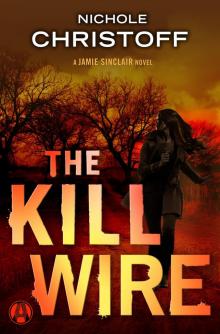 The Kill Wire
The Kill Wire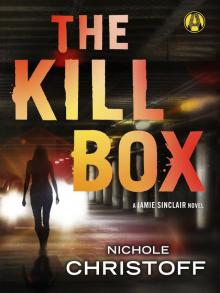 The Kill Box
The Kill Box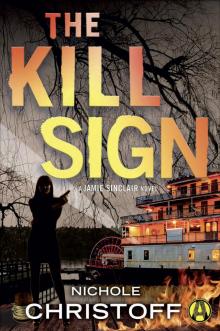 The Kill Radius
The Kill Radius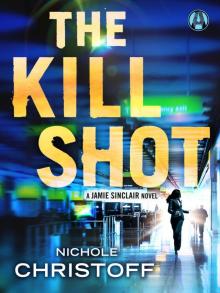 The Kill Shot
The Kill Shot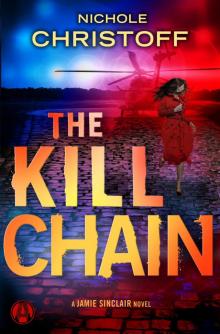 The Kill Chain
The Kill Chain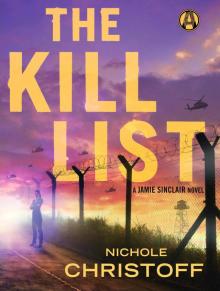 The Kill List
The Kill List